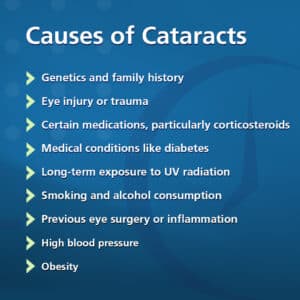We understand that choosing to undergo cataract surgery is a significant decision, and our experienced ophthalmology team at Tower Clock Eye Center is here to support you every step of the way.
As a leading ophthalmology practice in Wisconsin, we specialize in cataract surgery and refractive surgery, and provide the best care for patients dealing with cataracts.
Our clinic is here to help new patients understand everything they need to know about cataracts and guide them through their journey to clearer vision. For more information on cataract treatment or surgery, call (920) 499-3102 or schedule a consultation with one of our doctors.
What Are Cataracts?

Understanding the Causes of Cataracts
While aging is a primary cause, other factors that contribute to cataract development include:
- Genetics and family history
- Eye injury or trauma
- Certain medications, particularly corticosteroids
- Medical conditions like diabetes
- Long-term exposure to UV radiation
- Smoking and alcohol consumption
- Previous eye surgery or inflammation
The development of cataracts is typically gradual, allowing patients to explore their treatment options with experienced ophthalmologists. At Tower Clock Eye Center, we specialize in helping patients understand and manage this condition from early diagnosis through surgery and beyond.
Types of Cataracts

Nuclear Cataracts form in the center of the lens and are the most common age-related cataracts. They often temporarily improve near vision in patients before deteriorating, frequently referred to as “second sight.”
Cortical Cataracts affect the edges of the lens, creating white, wedge-shaped opacities that start in the periphery and work their way to the center. They affect the way light is scattered, causing significant problems with glare for patients.
Posterior Subcapsular Cataracts form at the back of the lens and can progress more rapidly than other types. They commonly affect younger people and can significantly impact near vision and vision in bright light.
Congenital Cataracts are present at birth or develop during childhood.
No matter what type of cataracts you’re dealing with, our experienced ophthalmology team is here to help.
Cataract Symptoms and Diagnosis
Understanding the symptoms of cataracts can help you detect cataracts early so you can get the treatment you need.
- Increased glare sensitivity, especially while driving
- Clouding of vision that progresses gradually
- Difficulty with night vision and poor vision in low light
- Colors appearing faded or yellowed
- Need for frequent prescription changes
- Double vision in a single eye
- Difficulty reading or performing detailed work
Our Cataracts Diagnosis Plan
We recognize that eye exams can be inconvenient, but our patient-centered approach ensures a smooth and thorough process so you can get a treatment plan tailored to your specific needs.
Our doctors specialize in diagnosing not only cataracts, but also retinal disease, cornea disease, and age-related macular degeneration. Here are the steps of what our thorough eye assessment looks like:
- Comprehensive medical history review
- Visual acuity testing
- Tonometry (Eye Pressure Test)
- Slit-lamp examination
- Dilated eye examination
We pride ourselves on delivering exceptional care with a personal touch. Our team will walk you through each step of the assessment and provide you with the compassionate care you deserve.
How To Treat Cataracts
Modern cataract surgery is a painless procedure that typically takes fewer than 10 minutes. It is one of the most performed surgeries, with ophthalmologists performing millions of these surgeries each year.
At Tower Clock Eye Center, we offer state-of-the-art surgical treatment options custom to each patient’s unique needs, including:
- Traditional cataract surgery with proven results
- Advanced Intraocular Lens (IOL) options for various lifestyle needs
- Astigmatism correction during surgery
- Laser-assisted cataract surgery in appropriate cases
When a patient needs cataract surgery, we begin with a consultation. During the appointment, we will perform several tests to measure your eyes. Then, we’ll discuss your surgery, detailing the advantages and disadvantages of all surgical and IOLs options. Lastly, we’ll schedule your procedure when it is convenient for you. Here’s what happens during the procedure:
Pre-Surgery Preparation
Your doctor will dilate your eyes and provide an anesthetic to ensure you’re comfortable. While you’ll be awake during the procedure, many patients receive mild sedation to help them relax. Our surgical team prioritizes making the experience as comfortable as possible.
During Surgery
- Using ultrasound technology, they break up the cloudy lens into small pieces.
- These pieces are gently removed through the small incision.
- Your doctor carefully places the new IOL through the same incision.
In most cases, the incision is so tiny it heals on its own without stitches. The entire procedure typically takes fewer than 10 minutes. Our doctors have years of experience performing this surgery in Green Bay and Appleton, and have refined their techniques to become among the most trusted and precise cataract surgeons in the region.
After Surgery
You’ll rest briefly in a recovery area before heading home. We will then provide detailed care instructions and schedule follow-up appointments. Most patients find they can return to normal activities within a few days, though complete healing takes several weeks.
If you have other eye conditions, such as glaucoma, retinal disease, or age-related macular degeneration, we will consider these factors when planning your care and recovery.
With modern surgical techniques, cataract surgery has become a safe, effective way to restore clear vision. Many patients who previously relied on glasses or contact lenses find their vision significantly improved after surgery, depending on the IOL selected. For new patients interested in learning more, schedule a consultation with one of our doctors.
Can Cataracts be Prevented?

Prevention Tips:
- Wear sunglasses and hats to protect your eyes from UV rays.
- Maintain a healthy diet rich in antioxidants, including vitamin C, vitamin E, and lutein.
- Avoid smoking and limit alcohol consumption, as these can increase cataract risk.
- Schedule regular eye exams to help detect cataracts in their early stages and monitor their progression.
By following these simple steps, you can reduce your risk of developing cataracts and help maintain clear vision as you age.
Contact Tower Clock Eye Center for Cataract Surgery
Our experienced team of ophthalmologists and eye surgeons has worked with thousands of patients throughout Wisconsin and Michigan’s Upper Peninsula to correct cataracts and manage vision care needs. Our dedicated team of doctors provides outstanding ophthalmology care, from routine eye exams to complex refractive surgery.
We welcome new patients seeking the best surgical care for their eyes at our state-of-the-art surgery centers in Green Bay and Appleton. Whether patients need cataract surgery, treatment for glaucoma, external disease management, refractive surgery, or help with other vision problems, our medical centers are equipped with the latest technology and expertise to help patients obtain optimal results.
To achieve the clear vision you deserve, call (920) 499-3102 or click here to schedule an appointment.

